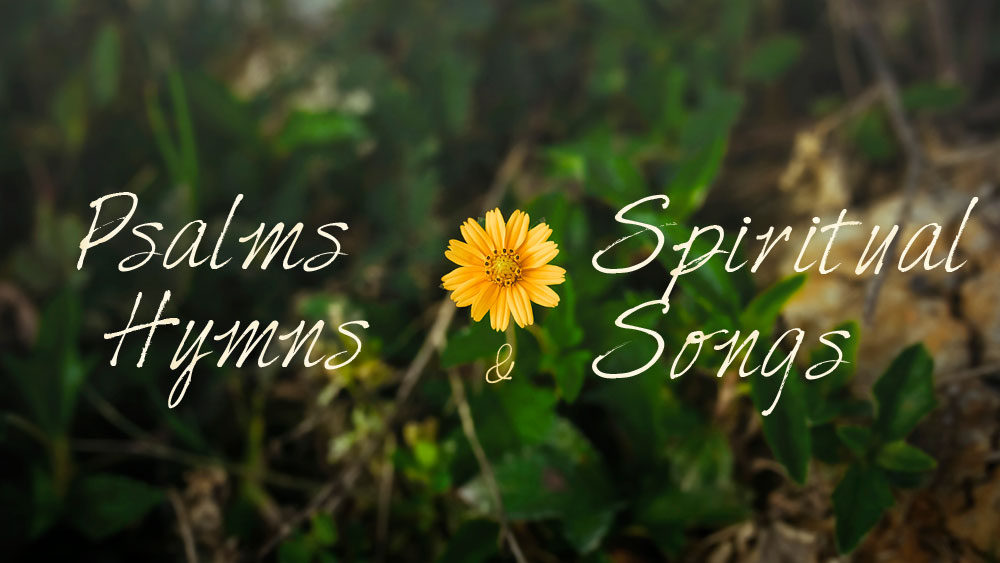[This sermon was part of a 10 week series on the book of Colossians]
“The younger Pliny, as the Roman governor to Bithynia, was ordered by the emperor Trajan to stamp out the Christians there. In a letter (written A.D. 112) he reported that they were in the habit of assembling on an appointed day (Sunday) before sunrise and singing responsively “a song to Christ as to God.” Writing in North Africa around A.D. 200, Turtullian described the Christian love feast as a time when “‘each is invited to sing to God in the presence of others from what he knows of the holy scripture or from his own heart.'”[1]
Singing and making melodies—whether internally or externally—is humankind’s nature. When one becomes complete in Christ, the natural inclination to praise finally finds its fulfillment and perfection as we sing to the Head of all things by the words and Spirit of the same.
Yes, in you God is and has perfected praise. If Beyoncé, The Beetles, and Beethoven collaborated on a #1 hit, it would still be no comparison to the exclusive New Testament praise produced by Christ and the Holy Spirit through his church (body) and accumulating in the Throne Room. This praise is a natural byproduct of salvation, and will aid us in our daily walk—whether high school, ministry, marriage, missions, or our professional jobs.
Colossians 3:16 Teaching Points
- Being in Christ and being filled with the Holy Spirit produces a New Covenant worship.
- Christ is the substance of scripture and centerpiece of worship, hence old psalms come alive under the revelation of Jesus Christ.
- My relationship with Christ (the head) is lacking if I’m not part of a body singing psalms, hymns and spiritual songs.
Setting Up Context: [Col 3:12-15 NKJV] 12 Therefore, as [the] elect of God, holy and beloved, put on tender mercies, kindness, humility, meekness, longsuffering; 13 bearing with one another, and forgiving one another, if anyone has a complaint against another; even as Christ forgave you, so you also [must do]. 14 But above all these things put on love, which is the bond of perfection. 15 And let the peace of God rule in your hearts, to which also you were called in one body; and be thankful.
12: Therefore—in light of the fact that you are a “new man (new humanity)”, chosen, set apart and loved by God the Father of Christ, replace the afore mentioned deeds (last week) with this list of virtues.
13: And forgive! What could qualify as the centerpiece of Christ’s story more than his forgiveness? Are we in Christ? We will be driven to forgive like he did; to do less would grieve the Holy Spirit.
14: And more importantly than all the virtues just listed, put on the agape love, which will bind Christ’s body (vs 15) (the church) and all the other virtues together in perfectness.
15: Allow (don’t resist) the peace of God (supernatural, not your own), for such is the state of a body: peace. As in a human body, all parts must rely on one another for the whole body to survive. A disruption in one area can have catastrophic effects on the whole body.
[Col 3:16 NKJV] 16 Let the word of Christ dwell in you richly in all wisdom, teaching and admonishing one another in psalms and hymns and spiritual songs, singing with grace in your hearts to the Lord.
We are exhorted to let the word of Christ dwell in us richly with wisdom. How is this done? We help one another by teaching and admonishing through psalms, hymns and spiritual songs directed towards the Lord. The parallels passage in Ephesians says to “be filled with the Spirit; Speaking to yourselves in psalms, hymns and spiritual songs, singing and making melody in your heart to the Lord”
Colossians: “Let the word of Christ dwell in you…”
Ephesians: “Be filled with the Holy Spirit…”
We sing then, filled with the word of Christ and the Holy Spirit. This is New Covenant worship! We have the word (knowledge) of Christ, taught and brought to our remembrance by the Holy Spirit. Singing in Christ while filled with the Holy Spirit is a special privilege we have as Christ’s body, as the “new man/humanity”. This special worship that glorifies the head while teaching and admonishing the body (the church). Singing psalms, hymns and spiritual songs is our duty as peacemakers towards one another.
It’s important to note that at the time of this writing they would sing the scripture, both the OT scriptures and new hymns that professed the gospel. We have a tendency to separate the scripture from singing because we all have complete bibles, but there were no New Testament bibles when Paul wrote this, and the oral traditions held as much weight to them as Christians today put on our physical bibles. To sing psalms, hymns and spiritual songs was to not only worship, but to memorize and share the stories of the God of the bible and of Jesus Christ. This is probably why “let the word of Christ dwell in you richly” is connected to singing.
“In the OT, songs were means through which God’s people remembered his mighty deeds, and through such deeds God made himself known. For Paul, believers also need to be educated through such confessions of God’s might act through his Son.”[2]
There is not the clearest of distinctions between psalms, hymns and spiritual songs. A hymn could be a psalm, but in this case there is a good chance hymns are referring more to songs that evolved after Christ’s ascension which glorify him as Lord. Some possible hymns that would have been memorized and sung included Phil 2:5-11, Col 1:15-20, 1Tim 3:16, Heb 1:1-3, and 1Pet 2:21-25. The psalms probably referred to the OT psalms, and spiritual songs could imply more informal singing as the Holy Spirit gave utterance (or be modifying psalms and hymns). There is overlap between all three.
Here is some of the uses of hymn and psalms I found:
Hymns hymne?
Paul and Silaas sang praises/hymns (hymne?) while imprisoned, during which an angel delivered them. (Acts 16:25)
Jesus sang hymns! After they celebrated what would become the Lord’s supper, they sang a hymn (Mark 14:26), probably one of the Psalms typically sung at Passover (Psalm 113-118). It’s awesome to think of Jesus singing these psalms at the last real Passover meal as he takes the focus off the temporary animal sacrificial lamb and onto his own body: the Lamb of God.
Jesus fulfilled a prophetic psalm referenced in Hebrews by being one who would sing praise (hymne?) in the midst of the church (assembly).
[Heb 2:12 ESV] 12 saying, “I will tell of your name to my brothers; in the midst of the congregation I will sing your praise.”
Other possible hymns/poems are listed below. Note 1 Timothy 3:16’s somewhat awkward placement in the context of church order and discipline. It was probably a hymn or creed that was conveniently placed there to remind the reader what the “mystery” referred to in 1 Tim 3:9 is referring to.
Phil 2:5-11, Col 1:15-20, 1 Tim 3:16, Heb 1:1-3, 1 Pet 2:21-25
Psalms: Music & Song
The singing of songs/psalms with spiritual gifts and teaching was the normative in the assembly. In context, Paul is affirming that all these things should be done in an orderly fashion for the edification of the body. What has the Holy Spirit blessed you with to edify the assembly?
[1Co 14:26 NKJV] 26 How is it then, brethren? Whenever you come together, each of you has a psalm, has a teaching, has a tongue, has a revelation, has an interpretation. Let all things be done for edification.
Are you merry/cheerful? There is a psalm for that.
[Jas 5:13 NKJV] 13 Is anyone among you suffering? Let him pray. Is anyone cheerful? Let him sing psalms.
It’s wonderful to read, pray, and teach from the book of Psalms today, but most, if not all of the psalms were meant to be sung. This shows the dedication for singing and its importance in the OT that carried over to the new.
Over 50 psalms have the title “for the director of music”. “There is general consensus that it indicates that the psalms were entrusted to the care of the person in charge of worship at the sanctuary.”[3] In 1 Chronicles 16:17, David delivers a song to Asaph, the head Levitical musician.
Psalms: Timeless
The Psalms are unapologetically human in their approach—expressing a wide range of human emotions and experiences from joy, fear, despair, anger, happiness, confusion, hope and love—while still being inspired by the Holy Spirit. The Psalms were written in such a way where the message is timeless. Take for example, Psalm 51. It is ascribed to David or inspired by David and involves his sin of adultery with Bathsheba. The content of the psalm is one of repentance, but does not go into specifics on the details of David’s sin. This way, the psalmist captures the heart of David’s prayer but writes in such a way where the prayer can be prayed and sung by many generations to come. No one has to be an adulterer to sing this song, but this song may have prevented many from going down that path. It may have also provided an outlet of prayer for those who have fallen so hard they don’t know what to pray or what to do next.
Hannah (1 Sam 2:1-11) and Mary (Luke 1:46-56) used portions of Psalm 113 as a part of their praise to God regarding their supernatural pregnancies.
What’s your life’s lament, psalm, or hymn? What is your song to God born out of trial?
The majority of Psalms fall into three main categories.
- Hymns – Songs of Praise
- Laments – Petitions to God, the largest overall category. “Psalms make it possible to say things that are otherwise unsayable.”[4]
- Thanksgiving – Similar to a hymn, but recounts a trial, then goes on to praise God for deliverance.
Other categories some choose to use:
- Wisdom/Instructional – Often compare the righteous and the wicked. Psalm 1 is a good example of a psalm of wisdom
- Confidence (Psalm 23)
- Liturgies – Psalms spoken by priests, festival psalms, psalms for entering the temple, etc
- Remembrance
- Royal – Psalm 2 is a good example. These poems were composed for events in the king’s life, prayers on behalf of the king or prayers for the king to pray himself. “These psalms were retained in the canon following the end of Israel’s and Judah’s monarchies, and they became part of the seedbed of messianic hope — Israel’s hope that one day the Lord would send the ideal Davidic king, the Messiah.”[5]
- Prophetic (not really a category, as any of the above genres can be prophetic) – While many psalms had prophetic meaning fulfilled in the New Testament (thou are my Son; this day have I begotten thee, thou wilt not leave my soul in hell, neither will thou suffer thine Holy One to see corruption, they pierced my hands and feet. Etc.), it’s important to note that they initially had meaning for the current situation. For example, when Psalms 2 says “The kings of the earth set themselves, and the rulers take counsel together, against the LORD, and against his anointed, saying…”, “his anointed” means the king of Judah at that time, and anointed has the double meaning of Messiah, which applied to Jesus much later. This is an example of the Holy Spirit revealing Jesus in the law, prophets, and psalms, which will be discussed later.
Many of these categories overlap and not every psalm will fit neatly into one. The prophetic category refers to Psalms clearly foreshadowing to the work of the Messiah—particularly the ones referenced by the New Testament writers—but finding Jesus in the psalms must not stop there. The testimony of Jesus is the Spirit of prophecy (Rev 19:10). Our study of Colossians tells us that the OT feasts, Sabbaths, and dietary laws are a shadow of things to come but the body/substance is found in Christ. Furthermore, all things consist in Christ.
Christ declared that the law, prophets, and psalms all spoke of him. He then opened up the apostles understanding so they might see Christ and the gospel in the OT scriptures.
[Luk 24:44-47 NKJV] 44 Then He said to them, “These [are] the words which I spoke to you while I was still with you, that all things must be fulfilled which were written in the Law of Moses and [the] Prophets and [the] Psalms concerning Me.” 45 And He opened their understanding, that they might comprehend the Scriptures. 46 Then He said to them, “Thus it is written, and thus it was necessary for the Christ to suffer and to rise from the dead the third day, 47 “and that repentance and remission of sins should be preached in His name to all nations, beginning at Jerusalem.
We should see Christ in the Psalms then! Those instructed in the Kingdom of Heaven are like a householder who bring forth from his treasure both new and old (Matt 13:52).
We admonish one another with all the Psalms—even the laments—looking for Jesus in all things. We are commanded to read and sing in the name of the Lord Jesus, giving thanks to God the Father through him—this includes reading the psalms and thanking God that everything foreshadows Jesus, as he is the substance/body (Col 2:17).
One author suggests these three points when reading the Psalms.
- Read the psalm as a prayer to Christ. The author of Hebrews did this. He quoted a Psalm that would have been sung to God in the Old Testament, now being sung specifically about Jesus. Also, many of the psalms uplift the Davidic King, of whom Jesus is the final and everlasting King of Judah.
- Sing the psalm as a prayer of Christ (sing/pray the same words Jesus did). “The laments, as we will see, often articulate the suffering of Jesus, while the hymns celebrate his glorification.”[6] “My God my God, why have you forsaken me?…”
- The imagery of God in the Psalm many times find their ultimate expression in Jesus. Jesus is King, Shepherd, Warrior, Suffering Servant, etc.
I’m not saying to dismiss the context or form of the psalm. Understanding the author, historical background, genre, and even its place in the five books that make up the Psalter is important to correctly interpreting the psalm. But take Colossians by faith and look for Christ in the psalms. I believe you will not be disappointed.
Conclusion
As a church, particularly in our small groups or more intimate fellowship settings (if you don’t have one outside of Sunday/Wednesday gatherings, you should create that opportunity), singing praises to God and rehearsing the story of Jesus is important to your personal spiritual health and those around you. We sing to God through Christ. We see Jesus in scripture as Lord, King, God, Shepherd, High Priest and Lamb through the illumination of the Holy Spirit. And we sing to him in order to allow the words of Christ to dwell in us richly and to admonish one another as a body.
- Being in Christ and being filled with the Holy Spirit produces a New Covenant worship.
- Christ is the substance of scripture and centerpiece of worship, hence old psalms come alive under the revelation of Jesus Christ.
- My relationship with Christ (the head) is lacking if I’m not part of a body singing psalms, hymns and spiritual songs.
[1] John Rea, Charisma's Bible Handbook on the Holy Spirit (Orlando, FL: Creation House, 1998), 262. [2] David W. Pao, Colossians and Philemon: Zondervan exegetical commentary series on the New Testament (Grand Rapids, MI: Zondervan, 2012), 249. [3] Longman III, Tremper (2014-11-07). Psalms: An Introduction and Commentary: 15-16 (Tyndale Old Testament Commentaries) (p. 30). InterVarsity Press. Kindle Edition. [4] John Goldingay, Psalms 1– 41 (Grand Rapids: Baker, 2006), p. 22. [5] Nancy L. DeClaisse?-Walford, Rolf A. Jacobson, and Beth LaNeel Tanner, The Book of Psalms (Grand Rapids, MI: William B. Eerdmans Publishing Company, 2014), Kindle, 21. [6] Longman, 50.



